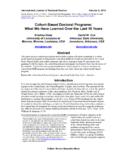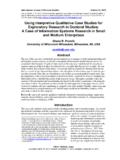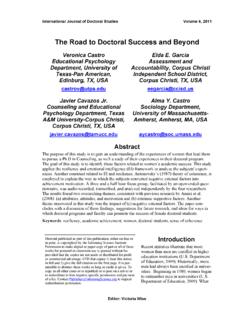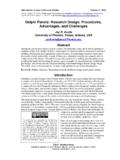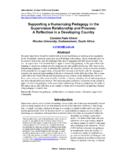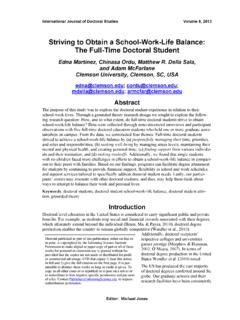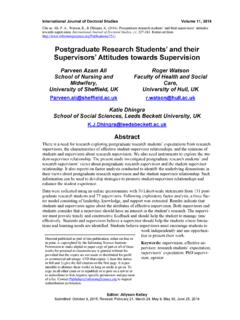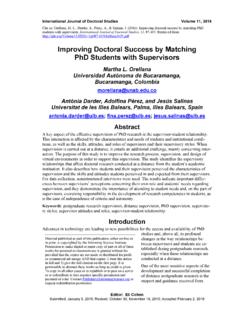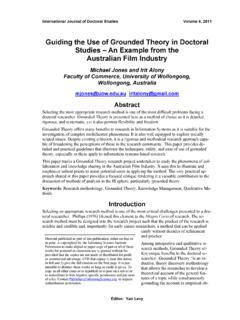Transcription of Hearing their Voices: Factors Doctoral Candidates ...
1 International Journal of Doctoral Studies Volume 7, 2012 Hearing their Voices: Factors Doctoral Candidates attribute to their persistence Lucinda S. Spaulding and Amanda J. Rockinson-Szapkiw Liberty University, Lynchburg, VA, USA Abstract The purpose of this phenomenological inquiry was to examine persistence Factors associated with the successful completion of a Doctoral degree in the field of education. Standardized open-ended interviews with a purposeful sample of 76 participants (42 females, 34 males) generated data leading to themes describing what Doctoral students experience (personal sacrifice, delayed ex-pectations, dissertation challenges) and the personal Factors (motivations for pursuing the degree, reasons for persisting, strategies for dissertation completion), social Factors (support systems and coping mechanisms), and institutional Factors (program characteristics) participants associated with their persistence . These findings provide a composite understanding of the essence of the struggles inherent in the journey and the Factors associated with Doctoral persistence .
2 Implications and recommendations for Doctoral Candidates are discussed. Keywords: persistence , doctorate, dissertation, attrition, phenomenology, teacher education Introduction Doctoral persistence is the continuance of a student s progress toward the completion of a doc-toral degree (Bair, 1999, p. 8). Studies over the last four decades show that 40% to 60% of doc-toral Candidates at some stage in the process fail to demonstrate Doctoral persistence ; that is, they do not achieve their goal of earning a terminal degree (Berelson, 1960; Bowen & Rudenstine, 1992; Council of Graduate Schools Completion Project, 2008). This phenomenon of doc-toral persistence and its converse, attrition, is most puzzling given that Paradoxically, the most academically capable, most academically successful, most stringently evaluated, and most care-fully selected students in the entire higher education system Doctoral students are the least likely to complete their chosen academic goals (Golde, 2000, p.)
3 199). In education graduate programs, the attrition rate is estimated to be 50% (Ivankova & Stick, 2007), and some reports indicate it may be as high as 70% (Nettles & Millet, 2006). Between 1983 and 2008 time-to-degree completion for graduate students in education programs increased from years to years, while decreasing from years to years in all other fields (Na-tional Science Foundation [NSF], 2009; Wao & Onwuegbuzie, 2011). Nettles and Millet (2006) found that across dis-ciplines, education ranked lowest in Doctoral student publications (15% compared to 30%) and presentations (30% compared to 37%). The nature and responsibility of Doctoral students enrolled in education programs may contribute to these statistics. The Material published as part of this publication, either on-line or in print, is copyrighted by the Informing Science Institute. Permission to make digital or paper copy of part or all of these works for personal or classroom use is granted without fee provided that the copies are not made or distributed for profit or commercial advantage AND that copies 1) bear this notice in full and 2) give the full citation on the first page.
4 It is per-missible to abstract these works so long as credit is given. To copy in all other cases or to republish or to post on a server or to redistribute to lists requires specific permission and payment of a fee. Contact to request redistribution permission. Editor: Chaya Herman Factors Doctoral Candidates attribute to their persistence typical Doctoral education student works full time ( , principal, administrator, teacher), with academic responsibilities serving to intensify demands on their energy, commitment, and time (Dorn, Papalewis, & Brown, 1996; Jimenez, 2011; Smith, Maroney, Nelson, Abel, & Abel, 2006). Full time employment constricts students to studying part time, and research suggests that part-time Doctoral students experience longer time-to-degree rates than those who are engaged full-time (Wao & Onwuegbuzie, 2011). Attrition and prolonged time-to-degree can be costly to institutions, but devastating and demoralizing for students as a result of the financial, personal, and professional consequences (Lovitts, 2001; Terrell, Snyder, & Dringus, 2009; Wao, 2010).
5 With education students experiencing the longest time-to-degree rates (NSF, 2009) and consis-tently high attrition rates (50% - 70%) (Ivankova & Stick, 2007; Nettles & Millet, 2006), research examining Factors associated with persistence is timely and pertinent. The purpose of this study was to learn from individuals with earned educational doctorates the personal, social, and institu-tional Factors they attributed to their Doctoral persistence and degree completion. The theory of resilience and Tinto s (1975, 1993) student integration theory served as the conceptual framework for this study. Conceptual Framework At its simplest, resilience is defined as success despite adversity (Cefai, 2004; Luthar, Cicchetti, & Becker, 2000). While resilience research traditionally focused on generating lists of risk and protective Factors (see Garmezy, 1971; Werner, Bierman, & French, 1971), resilience is now viewed as the interaction between the individual and resources and stressors in the larger so-ciocultural context (Clauss-Ehlers, 2008; Luthar et al.)
6 , 2000). Thus, resilience research is nested within an ecological model that emphasizes contextual Factors and interactions between individu-als and their environment. Given attrition statistics, beginning a Doctoral degree involves risk. Brailsford (2010) observed, There is a body of quantitative and qualitative research proving that deciding to do a is a high-risk strategy (p. 15). Moreover, Candidates beginning Doctoral degrees in education are par-ticularly at high risk given statistics suggesting that the likelihood that they will earn their doctor-ate hovers between 50% and 30% (Ivankova & Stick, 2007; Nettles & Millet, 2006). If they do persist to completion, their journey is on average longer than that of Candidates in all other disci-plines (NSF, 2009; Wao & Onwuegbuzie, 2011). The emphasis in resilience research on the interaction between individuals and their environment aligns with Tinto s (1993) integration theory which posits that graduate persistence is shaped by the personal and intellectual interactions that occur within and between students and faculty and the various communities that make academic and social systems of the institution (p.
7 231). Conversely, when students fail to become integrated into their university s academic and social communities, they are more likely to withdraw. Tinto s (1975, 1993) theory is affirmed through various studies examining Doctoral persistence and attrition (see Earl-Novell, 2006; Herzig, 2002; Hoskins & Goldberg, 2005; Ivankova & Stick, 2007). The literature review and research findings from this study are organized within the framework of Tinto s student related and institutionally related Factors . Review of the Literature Review of the literature reveals that Doctoral persistence is not the result of one single factor (Bair, 1999; Gardner, 2009; Wao, 2010), but rather, an interaction of multiple Factors generally categorized as student related Factors or institutional Factors (Ivankova & Stick, 2007; Tinto, 1993; Wao, 2010). Student related Factors and institutional Factors interact and contribute to the 200 Spaulding & Rockinson-Szapkiw level the student becomes integrated into the university, which is essential to persistence (Tinto, 1993, 1997, 1998).
8 Student Related Factors A range of student related Factors are associated with persistence , including demographic vari-ables, personal attributes, motivation and goals, responsibilities, and coping skills. Demographic variables. Demographic variables related to persistence include age, gender, eth-nicity, and marital status (Strayhorn, 2005; Wao & Onwuegbuzie, 2011). Men are more likely to finish than women, older Caucasian students are more likely to graduate than older minority stu-dents (Stiles, 2003), and married students are more likely to persist than unmarried students (Lott Gardner, & Powers, 2009; Price, 2006). Personal attributes. Personal attributes such as learning style, intelligence, GRE, GPA, admis-sion interview performance, personality, and level of intrinsic motivation are positively associ-ated with persistence (Lovitts, 2005). Student ownership of the dissertation is integral (Earl-Novell, 2006), though it may depend on the nature of the program and discipline.
9 For example, in some programs independent thought and creativity are valued, while in others, diligence and hard work may be admired (Earl-Novell, 2006). McAlpine and Norton (2006) observed that Humani-ties and social sciences tend to take a more individual approach to research, whereas natural and health sciences favour more team based research. The latter approach may make students less likely to withdraw (p. 9). Competence and being proactive are also associated with persistence (Grover, 2007). Conversely, student traits of dependency, unrealistic thought processes, and pro-crastination are impediments to finishing the Doctoral program (Terrell, 2002). Motivation. Motivation and goal setting are integral to Doctoral persistence (Grover, 2007). Re-search suggests that Candidates who are both personally and professionally motivated are more likely to persist (Hoskins & Goldberg, 2005). Personal motivations are typically associated with achievement, personal goals, enjoying a challenge, and desiring the title.
10 Professional motiva-tions cited typically include Factors associated with career advancement, such as increasing per-sonal marketability and credibility, as well as being eligible or recognized for a promotion or raise. Motivation is related to goals and achievement, with research suggesting that goals may change over the course of degree completion. For example, Wao and Onwuegbuzie (2011) found that many students enter programs without a goal to conduct research; however, after being inte-grated into the program, they found that they really enjoyed research and this became an aca-demic goal. Responsibilities. Balancing Doctoral studies with family and work relationships is a challenge for Doctoral students across disciplines. In a quantitative study surveying 619 students across 78 doc-toral programs, Wasburn-Moses (2008) reported that Doctoral students felt least satisfied with their ability to juggle work and family with their overall workload (p.)
